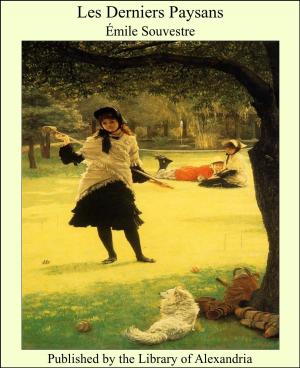My Day: Reminiscences of a Long Life
Nonfiction, Religion & Spirituality, New Age, History, Fiction & Literature| Author: | Sara Agnes Rice Pryor | ISBN: | 9781465624109 |
| Publisher: | Library of Alexandria | Publication: | March 8, 2015 |
| Imprint: | Language: | English |
| Author: | Sara Agnes Rice Pryor |
| ISBN: | 9781465624109 |
| Publisher: | Library of Alexandria |
| Publication: | March 8, 2015 |
| Imprint: | |
| Language: | English |
I am constrained to encourage a possible reader by assuring him that I have no intention whatever of writing strictly an autobiography. Nothing in myself nor in my life would warrant me in so doing. I might, perhaps, except the story of the Civil War, and my part in the trials and sorrows of my fellow-women, but this story I have fully and truly told in my "Reminiscences of Peace and War." My countrymen were so kind to these first stories that I feel I may claim some credentials as a "babbler of Reminiscences." Besides, I have lived in the last two-thirds of the splendid nineteenth century, and have known some of the men and women who made that century notable. And I would fain believe with Mr. Trollope that "the small records of an unimportant individual life, the memories which happen to linger in the brain of the old like bits of drift-wood floating round and round in the eddies of a back-water, can more vividly than anything else bring before the young of the present generation those ways of acting and thinking and talking in the everyday affairs of life which indicate the differences between themselves and their grandfathers." But I shall have more than this "floating driftwood" to reward the reader who will follow me to the end of my story! Writers of Reminiscences are interested—perhaps more interested than their readers—in recalling their earliest sensations, and through them determining at what age they had "found themselves"; i.e. become conscious of their own personality and relation to the world they had entered. Long before this time the child has seen and learned more perhaps than he ever learned afterwards in the same length of time. He has acquired knowledge of a language sufficient for his needs. His miniature world has been, in many respects, a foreshadowing of the world he will know in his maturity. He has learned that he is a citizen of a country with laws,—some of which it will be prudent to obey,—such as the law against taking unpermitted liberties with the cat, or touching the flame of the candle; while other laws may be evaded by cleverness and discreet behavior. He finds around him many things; pictures on walls, for instance, that may be admired but never touched,—other lovely things that may be handled and even kissed, but must be returned to mantels and tables,—and yet others, not near as delightful as these, "poor things but his own," to be caressed or beaten, or even broken at his pleasure. He has learned to indulge his natural taste for the drama. His nurse covers her head with a paper and becomes the dreadful, groaning villain behind it, while the baby girds himself for attack, tears the disguise from the villain, and shouts his victory. As he learns the names and peculiarities of animals, the scope of the drama widens. He is a spirited horse, snorting and charging along, or—if his picture-books have been favorable—a roaring lion from whom the nurse flees in terror. Of the domestic play there is infinite variety—nursing in sickness, the doctor, baby-tending, cooking,—and once, alas! I heard a baby girl of eighteen months enact a fearful quarrel between man and wife, ending firmly "I leave you! I never come back!" These natural tendencies of children would seem to prove that the soul or mind of man can be "fetched up from the cradle"—a phrase for which I am indebted to one of my contemporaries, Mr. Leigh Hunt, who in turn quoted it as a popular phrase in his late (and my early) day. But with the single exception of the spoken language all these childish plays have been successfully taught to our humble brothers; to our poor relation the monkey, the dog, elephant, seal, canary bird—even to fleas. All these are capable of enacting a short drama.
I am constrained to encourage a possible reader by assuring him that I have no intention whatever of writing strictly an autobiography. Nothing in myself nor in my life would warrant me in so doing. I might, perhaps, except the story of the Civil War, and my part in the trials and sorrows of my fellow-women, but this story I have fully and truly told in my "Reminiscences of Peace and War." My countrymen were so kind to these first stories that I feel I may claim some credentials as a "babbler of Reminiscences." Besides, I have lived in the last two-thirds of the splendid nineteenth century, and have known some of the men and women who made that century notable. And I would fain believe with Mr. Trollope that "the small records of an unimportant individual life, the memories which happen to linger in the brain of the old like bits of drift-wood floating round and round in the eddies of a back-water, can more vividly than anything else bring before the young of the present generation those ways of acting and thinking and talking in the everyday affairs of life which indicate the differences between themselves and their grandfathers." But I shall have more than this "floating driftwood" to reward the reader who will follow me to the end of my story! Writers of Reminiscences are interested—perhaps more interested than their readers—in recalling their earliest sensations, and through them determining at what age they had "found themselves"; i.e. become conscious of their own personality and relation to the world they had entered. Long before this time the child has seen and learned more perhaps than he ever learned afterwards in the same length of time. He has acquired knowledge of a language sufficient for his needs. His miniature world has been, in many respects, a foreshadowing of the world he will know in his maturity. He has learned that he is a citizen of a country with laws,—some of which it will be prudent to obey,—such as the law against taking unpermitted liberties with the cat, or touching the flame of the candle; while other laws may be evaded by cleverness and discreet behavior. He finds around him many things; pictures on walls, for instance, that may be admired but never touched,—other lovely things that may be handled and even kissed, but must be returned to mantels and tables,—and yet others, not near as delightful as these, "poor things but his own," to be caressed or beaten, or even broken at his pleasure. He has learned to indulge his natural taste for the drama. His nurse covers her head with a paper and becomes the dreadful, groaning villain behind it, while the baby girds himself for attack, tears the disguise from the villain, and shouts his victory. As he learns the names and peculiarities of animals, the scope of the drama widens. He is a spirited horse, snorting and charging along, or—if his picture-books have been favorable—a roaring lion from whom the nurse flees in terror. Of the domestic play there is infinite variety—nursing in sickness, the doctor, baby-tending, cooking,—and once, alas! I heard a baby girl of eighteen months enact a fearful quarrel between man and wife, ending firmly "I leave you! I never come back!" These natural tendencies of children would seem to prove that the soul or mind of man can be "fetched up from the cradle"—a phrase for which I am indebted to one of my contemporaries, Mr. Leigh Hunt, who in turn quoted it as a popular phrase in his late (and my early) day. But with the single exception of the spoken language all these childish plays have been successfully taught to our humble brothers; to our poor relation the monkey, the dog, elephant, seal, canary bird—even to fleas. All these are capable of enacting a short drama.















